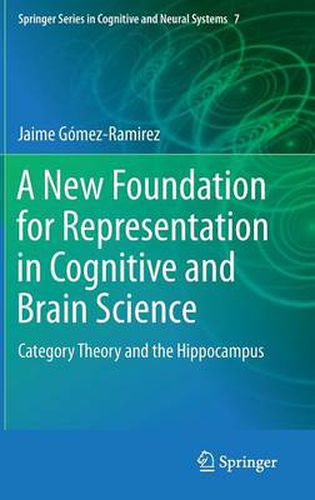Readings Newsletter
Become a Readings Member to make your shopping experience even easier.
Sign in or sign up for free!
You’re not far away from qualifying for FREE standard shipping within Australia
You’ve qualified for FREE standard shipping within Australia
The cart is loading…






This title is printed to order. This book may have been self-published. If so, we cannot guarantee the quality of the content. In the main most books will have gone through the editing process however some may not. We therefore suggest that you be aware of this before ordering this book. If in doubt check either the author or publisher’s details as we are unable to accept any returns unless they are faulty. Please contact us if you have any questions.
The purpose of the book is to advance in the understanding of brain function by defining a general framework for representation based on category theory. The idea is to bring this mathematical formalism into the domain of neural representation of physical spaces, setting the basis for a theory of mental representation, able to relate empirical findings, uniting them into a sound theoretical corpus.
The innovative approach presented in the book provides a horizon of interdisciplinary collaboration that aims to set up a common agenda that synthesizes mathematical formalization and empirical procedures in a systemic way. Category theory has been successfully applied to qualitative analysis, mainly in theoretical computer science to deal with programming language semantics. Nevertheless, the potential of category theoretic tools for quantitative analysis of networks has not been tackled so far. Statistical methods to investigate graph structure typically rely on network parameters. Category theory can be seen as an abstraction of graph theory. Thus, new categorical properties can be added into network analysis and graph theoretic constructs can be accordingly extended in more fundamental basis. By generalizing networks using category theory we can address questions and elaborate answers in a more fundamental way without waiving graph theoretic tools. The vital issue is to establish a new framework for quantitative analysis of networks using the theory of categories, in which computational neuroscientists and network theorists may tackle in more efficient ways the dynamics of brain cognitive networks.
The intended audience of the book is researchers who wish to explore the validity of mathematical principles in the understanding of cognitive systems. All the actors in cognitive science: philosophers, engineers, neurobiologists, cognitive psychologists, computer scientists etc. are akin to discover along its pages new unforeseen connections through the development of concepts and formal theories described in the book. Practitioners of both pure and applied mathematics e.g., network theorists, will be delighted with the mapping of abstract mathematical concepts in the terra incognita of cognition.
$9.00 standard shipping within Australia
FREE standard shipping within Australia for orders over $100.00
Express & International shipping calculated at checkout
This title is printed to order. This book may have been self-published. If so, we cannot guarantee the quality of the content. In the main most books will have gone through the editing process however some may not. We therefore suggest that you be aware of this before ordering this book. If in doubt check either the author or publisher’s details as we are unable to accept any returns unless they are faulty. Please contact us if you have any questions.
The purpose of the book is to advance in the understanding of brain function by defining a general framework for representation based on category theory. The idea is to bring this mathematical formalism into the domain of neural representation of physical spaces, setting the basis for a theory of mental representation, able to relate empirical findings, uniting them into a sound theoretical corpus.
The innovative approach presented in the book provides a horizon of interdisciplinary collaboration that aims to set up a common agenda that synthesizes mathematical formalization and empirical procedures in a systemic way. Category theory has been successfully applied to qualitative analysis, mainly in theoretical computer science to deal with programming language semantics. Nevertheless, the potential of category theoretic tools for quantitative analysis of networks has not been tackled so far. Statistical methods to investigate graph structure typically rely on network parameters. Category theory can be seen as an abstraction of graph theory. Thus, new categorical properties can be added into network analysis and graph theoretic constructs can be accordingly extended in more fundamental basis. By generalizing networks using category theory we can address questions and elaborate answers in a more fundamental way without waiving graph theoretic tools. The vital issue is to establish a new framework for quantitative analysis of networks using the theory of categories, in which computational neuroscientists and network theorists may tackle in more efficient ways the dynamics of brain cognitive networks.
The intended audience of the book is researchers who wish to explore the validity of mathematical principles in the understanding of cognitive systems. All the actors in cognitive science: philosophers, engineers, neurobiologists, cognitive psychologists, computer scientists etc. are akin to discover along its pages new unforeseen connections through the development of concepts and formal theories described in the book. Practitioners of both pure and applied mathematics e.g., network theorists, will be delighted with the mapping of abstract mathematical concepts in the terra incognita of cognition.